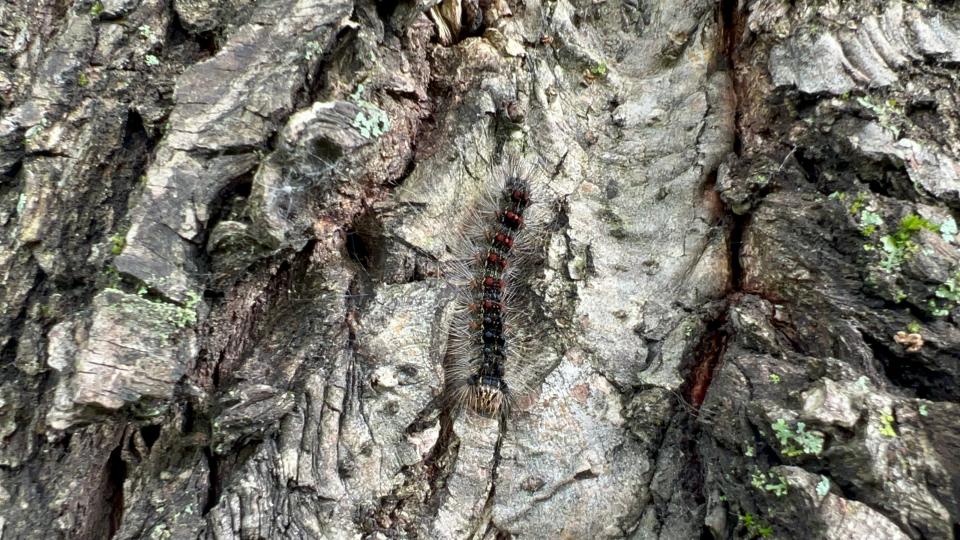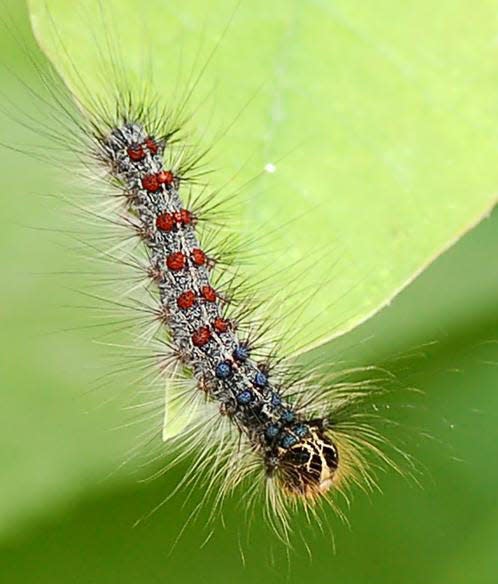As sure as the sun will rise, pests will bug generations of gardeners | Theodore Decker
One summer in my teens we endured a near-biblical insect plague, not of locusts, but caterpillars.
I'll never forget it.
Our home, atop a mountain in upstate New York, backed up to a few thousand acres of state game lands. The forest of mostly oaks ran largely unbroken for miles behind us.
During the year I'm remembering, there was a population explosion of an invasive species now known as the spongy moth.
If you have never lived through a caterpillar plague, the following descriptions will seem fabricated.

I swear to you it is all true. In fact, as I discovered earlier this summer during a trip to north-central Pennsylvania, it's all happening again there as well as in some other places.
These caterpillars are eating machines. They defoliate entire forests, making the mountainsides look more like March than June.

At peak infestation, undulating mats of caterpillars cross the roads, staining the pavement brown with their innards and droppings.
About those droppings. All day long in the forest, it sounds like a steady rain is falling.
We had a few old oaks in our yard, and my parents were desperate to save them from being devoured.
The only real frontline defense was a product called Tanglefoot. My dad painted bands of the gluey substance around each trunk a few feet off the ground. In theory, the caterpillars would be stopped in their tracks as they headed up the tree.
It mostly worked, although interlocking tree branches high above us provided the caterpillars the pathways to move between trees without ever touching the ground.
The ones that did try a ground assault would fill the trunk right up to the barricade, then begin climbing over the entrapped and dead brethren before them until they also became stuck. It was like watching orcs sacrifice themselves to advance the whole orc army. They would build a bridge of caterpillar corpses.
My parents were avid gardeners constantly battling against a range of pests, and my father took this caterpillar onslaught personally.
Gardening: Maximize the size of your tomatoes by following these helpful pointers
I remember him pouring kerosene into the bottom inch of a galvanized steel bucket. Muttering and cursing the caterpillars, he plucked them off the trunk and flung them into the kerosene until they were piled thick and squirming.
Then he set them on fire.
Watching this as a teenager, I reacted as probably any teenager would.
My old man, I thought, is NUTS.
Gardening: Don't miss a chance to win $500 and show off your gardening talents
I was reminded of this last week, as I stood in a shady corner of my backyard, looking at a small plot of evening primrose taken from my parents' garden.
It has flourished there and grown undisturbed for years.
Until last week. In a matter of a few days, something decimated the entire plot. A few skeletonized leaves clung to otherwise bare stems.
I thought of all the garden wars I now wage in middle age.
An ongoing cleanup of the garage this summer just uncovered a wall chart of common garden pests, a shaker can of coyote urine granules to scare off the deer and rodents, and a frightening amount of malathion insecticide used on mosquitos and various insects that attack landscaping plants, vegetables, shrubs, and more.
I regularly curse the white flies that descend upon my tomato plants, the squirrel that seems intent on tunneling to the other side of the world via my pot of elephant ears, and the black spot fungus that stripped my rose bush of leaves as effectively as any spongy moth caterpillar.
I know why my anger over these showdowns is so outsized, why my parents had the same reaction. I like to think that in a world in which I am largely powerless, I do at least have some control over my little corner of it. My yard is my personal Eden, shaped and nurtured by me.
And then a bug moves in, mows it all down, and poops it out in little black pellets.

I haven't identified the primrose culprit yet. But in the coming days I'll probably be on my hands and knees more than once, searching for the offender while talking to myself.
I would not be surprised if somewhere inside the house, my children will be shaking their heads in mutual bewilderment.
Our old man, they will agree, is NUTS.
Theodore Decker is the Dispatch metro columnist.
tdecker@dispatch.com
@Theodore_Decker
This article originally appeared on The Columbus Dispatch: War against pests waged by generations of gardeners

